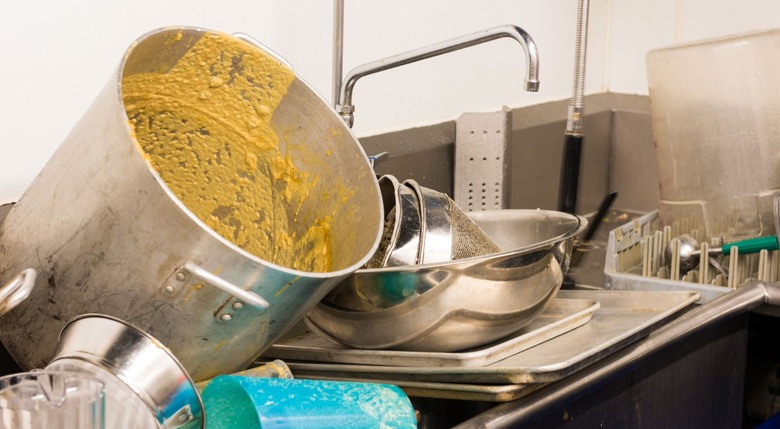Can You Actually Wash Dishes At A Restaurant If You Can't Pay?
By now, just about everybody has heard the old cliché about being forced to wash dishes at a restaurant if you're unable to pay your bill. But do any restaurant owners actually put this into practice? And if not, what do they do when someone can't pay his or her bill?
In order to answer this question, we spoke with a handful of restaurant owners; most of them asked to remain off the record, but three let us use their name: chef Kenny Gilbert, the owner of Gilbert's Underground Kitchen in Fernandina Beach, Florida; Jason Brunetti, the owner and head pizzaiolo of New York's popular Pizzetteria Brunetti, and Georges Briguet, the proprietor of New York's upscale and venerable (now sadly closed) Le Perigord. Here's what they had to say:
Kenny Gilbert: "If a guest cannot pay their bill, the first thing I would do is get a copy of their license to write down their information. They would not be able to work in the restaurant without being an employee because of the liability. If we could have them work to pay off their meal, I would have them do the messiest jobs that we have — cleaning out the dumpsters, the bathrooms, and cleaning the inside of the barbecue grills and smokers."
Jason Brunetti: "I had a new customer come in on a date. When it came time to pay the check, his credit card was declined and he didn't have any cash on him. He was clearly embarrassed, all the more so because up until then he'd been making a good impression on his date! I asked if he'd enjoyed the food and had a good time. He said he had and I told him that was good enough for me. He showed up the next day with cash for the bill and a tip for the server. And he's come back any number of times since then." [pullquote:left]
Georges Briguet: "Someone being unexpectedly unable to pay happens every month. We handle it very simply; we get the person's address and send an invoice. About 99 percent of the time we get a check. Expecting or asking anyone — or even accepting an offer — to wash dishes or do any work at the restaurant would be preposterous."
All of the other chefs we spoke with essentially said the same thing: Customers not being able to pay for their meal, usually due to a credit card being declined, happens more often than you might think. Most owners and managers are willing to give the benefit of the doubt and work out a mutually agreeable solution. Most of the time the customer will give the restaurant some sort of collateral, like a cell phone or watch, until they're able to come back and settle the bill.
Sending them into the back to wash dishes, even though it might have been more commonplace a hundred years ago, simply isn't considered a viable option nowadays, for several reasons. One, most kitchens are very tight, and introducing someone who's most likely never been in a professional kitchen before is more trouble than it's worth. Two, dishwashing equipment today is high-tech and efficient, and operating one effectively requires some training. Three, most restaurants already have dishwashers on staff and don't need the extra help. Four, if the new dishwasher is injured while washing the dishes, the restaurant might have a lawsuit on their hands. And five, if it's a union-run restaurant, having an outsider working in the kitchen might be illegal.
So if you find yourself pulling out your pockets at a restaurant, you're more than welcome to suggest heading into the kitchen to wash dishes, but the restaurant's staff will probably just think of it as a very poorly timed joke, unless you happen to be in this Parisian pop-up restaurant.
